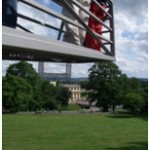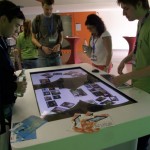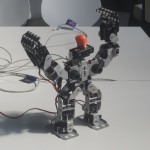The 4th ECC conference of ECREA, the European Communication Research Association, was located in Instanbul. It provided a perfect platform to meet and discuss profound transformations that are taking place globally in modern societies. While social media was the particular focus at this years conference, contemporary topics were encouraged, regarding the old and the new within the European communicative sphere. Graduate Members Benny Liebold and Daniel Pietschmann visited Istanbul and engaged in discussions about new theoretical research and empirical studies presented at the conference. Each thematic section and temporary working group of ECREA hosted parallel panels at the main conference, including Audience and Reception Studies, Digital Culture and Communication, Interpersonal Communication and Social Interaction. Both Crossworld colleagues are active members of the TWG Digital Games Research which hosted a preconference prior to the ECC. After one week of networking, fruitful discussions and interesting talks with the European Communication Research Community, both graduates returned with new ideas, contacts and concepts for research cooperations within the field of media psychology and virtual worlds.
CrossWorlds / Conferences
Conferences
The Bernstein Conference Computational Neuroscience (BCCN) is the largest European conference in Computational Neuroscience. This year the conference was hosted by the Bernstein Center Munich (September 12-14). It was filled with three days of stimulating presentations of international top researchers from MIT, Harvard, UCL, Stanford, or MPI, giving insights in their newest brain research and modeling. The conference provided the opportunity to present new research approaches and results in two poster sessions in the evening.
Beside the interesting contributions of many other researchers all over the world the CrossWorlds member Michael Teichmann presented its well frequented poster to “Learning invariance in object recognition”. The poster reviews his current work and gives an insight how models of the visual system could be designed and trained to obtain human-like recognition and processing abilities. The poster abstract is published in the conference proceedings by Frontiers of Computational Neuroscience (Abstract)
 The biennial conference of the German Society for Sociology (DGS) with the 2012 headline “Diversity and Coherence” was held during the first week of October at the Ruhr University Bochum. More than 2.100 participants listened to featured lectures, discussed in plenary meetings or learned about recent research in self organized ad hoc groups. CrossWorlds collegiates Kalja Kanellopoulos and Andreas Bischof attended the conference. Andreas presented findings of his Master Thesis (published OpenAccess here) as part of the group “Virtual Worlds: Between Euphoria and Pathologisation – Sociological Approaches and empirical Analyses“. Read the rest of this entry »
The biennial conference of the German Society for Sociology (DGS) with the 2012 headline “Diversity and Coherence” was held during the first week of October at the Ruhr University Bochum. More than 2.100 participants listened to featured lectures, discussed in plenary meetings or learned about recent research in self organized ad hoc groups. CrossWorlds collegiates Kalja Kanellopoulos and Andreas Bischof attended the conference. Andreas presented findings of his Master Thesis (published OpenAccess here) as part of the group “Virtual Worlds: Between Euphoria and Pathologisation – Sociological Approaches and empirical Analyses“. Read the rest of this entry »
9. Workshop Virtuelle und Erweiterte Realität 2012 (9th Workshop Virtual and Augmented Reality 2012)
 The 9th Workshop for Virtual and Augmented Reality from September 19 to 20 in Düsseldorf was an opportunity for young academics of that research field to publish their findings and get to know scientists with similar interests. The collegiate Vincent Küszter presented his paper “Erweiterung des Position-Based-Dynamic-Verfahrens für die Kollisionsbehandlung für Kleidung an animierten Menschmodellen” (Expansion to Position Based Dynamics to improve Collisions for Clothin and Virtual Humans) in a talk at the workshop.
The 9th Workshop for Virtual and Augmented Reality from September 19 to 20 in Düsseldorf was an opportunity for young academics of that research field to publish their findings and get to know scientists with similar interests. The collegiate Vincent Küszter presented his paper “Erweiterung des Position-Based-Dynamic-Verfahrens für die Kollisionsbehandlung für Kleidung an animierten Menschmodellen” (Expansion to Position Based Dynamics to improve Collisions for Clothin and Virtual Humans) in a talk at the workshop.
Many attendees were showing gesture based or touch interfaces, which synergizes with our research at CrossWorlds. Socializing with the other scientists was not only possible between the presentations or demo sessions, but also at the Kunstsammlung Nordrhein-Westfalen, where the attendees took a guided tour.
Vom 9.-12. September besuchten sieben Kollegiaten des Graduiertenkollegs die Konferenz „Mensch und Computer 2012“ in Konstanz. Das diesjährige Motto lautete „Interaktiv Informiert allgegenwärtig & allumfassend!?“.
Über die vier Konferenztage gab es ein breites Angebot an Fachvorträgen, Workshops, Diskussionen, Tutorien und Demonstrationen zum Themenbereich „Mensch-Computer-Interaktion“. Höhepunkte der Konferenz waren unter anderem die Keynotes von Miriam Meckel und Giles Colborne. Ebenso boten die Abendveranstaltungen gute Möglichkeiten mit anderen Wissenschaftlern unterschiedlicher Fachgebiete in Kontakt zu kommen.
Im Rahmen der Demo-Session „inter | aktion“ konnten interaktive Demonstrationen aus 20 Projekten genauer unter die Lupe genommen und mit den beteiligten Wissenschaftlern und Unternehmensvertretern diskutiert werden. Viele der vorgestellten Projekte basierten auf touchempfindlichen Oberflächen wie Tablets und Multitouchtischen oder auf gestenbasierter Interaktion mit Hilfe der Microsoft Kinect. Diese und andere Projekte boten den Kollegiaten Denkanstöße und Inspirationen für ihre eigenen und gemeinsamen Vorhaben.
The 3rd International Symposium on Facial Analysis and Animation (FAA) was held on September 21 at the Museum of Young Arts in Vienna. According to the organizing committee the FAA is the only international conference that solely focusses on the analysis of animation of faces. The field of participants ranged from social scientists who analyzed the perception of different animation techniques to companies that presented their newest tracking algorithms. Therefore the talks as well as the poster presentations gave a good overview of this very interesting field of research with multiple relations both to professional applications (e.g. entertainment industry) and interdisciplinary research.
One of the currently investigated research topics is performance driven animation, i.e. facial animation controlled by facial movements of human actors. Despite the fact that the state of development of the presented animations seems intriguingly spohisticated the research community aims at even more robust methods for both tracking and animating for professional applications. Another interesting topic are facial analysis and animation tools with live support that do not require professional 3D-tracking hardware but rely on consumer hardware like simple webcams (Image Metrics Live Driver) or the Microsoft Kinect (Face Shift) instead.
At the conference CrossWorlds made some interesting contacts to both professionals and researchers resulting in research collaborations with Image Metrics and intense information exchange with researchers from different backgrounds.
Anke Tallig und Kai-Uwe Martin vertraten das Graduiertenkolleg auf der vom 21.-26. August 2012 stattgefundenen Campus Party Europe in Berlin, dem größten europäischen Technologie-Festival mit Themen rund um Computertechnik, Software sowie Internet und daraus entstehender sozialen Interaktion und Verantwortung.
Mehr als 10.000 Forscher, Innovatoren und Technikbegeisterte aus 77 Ländern trafen sich zum ersten Mal in Deutschland zum intensiven Wissensaustausch und zur Bildung von gemeinsamen Interessennetzwerken. Mehr als 200 Vorträge präsentierten den aktuellen Stand der Technik (sowohl aus informatischer als auch aus sozialwissenschaftlicher Perspektive) und luden anschließend zum Meinungsaustausch und zu Fachgesprächen ein. Read the rest of this entry »
Inzwischen bearbeitet das Kolleg in Tandemgruppen Promotionsprojekte und in gemischten Fachgruppen verschiedene übergeordnete Teilbereiche des Forschungsvorhabens. Daraus folgen nun erste konkrete Publikationen aus den Arbeitsgruppen: Andreas Bischof stellt im Oktober auf dem 36. Kongress der Deutschen Gesellschaft für Soziologie in der Gruppe “Virtuelle Welten: zwischen Euphorie und Pathologisierung. Soziologische Zugänge und empirische Analyse” das theoretische Framework (Interaktionsanalyse-Goffman-Techniksoziologie) seines Dissertationsprojekts vor. Vincent Küszter trägt Ende September seinen Ansatz zur “Erweiterung des Position-Based-Dynamic-Verfahrens für die Kollisionsbehandlung für Kleidung an animierten Menschmodellen” auf dem 9. Workshop Virtuelle und Erweiterte Realität 2012 der Gesellschaft für Informatik vor.
 Vom 30.06. – 03.07. besuchten die beiden Kollegiaten Michael Heidt und Kalja Kanellopoulos die documenta (13) in Kassel. Die im Fünfjahrestakt stattfindende und jeweils 100 Tage dauernde Veranstaltung war dieses Mal der künstlerischen Forschung gewidmet. Im Fokus standen Formen der Einbildungskraft, die Materie, Dinge, tätiges Leben und Engagement in Verbindung mit Theorie und aktuellen Forschungen auf verschiedensten Feldern untersuchen. Dabei wurden wissenschaftliche, künstlerische und historische ebenso wie zeitgenössische Erkenntnisse mit einbezogen. Gemäß der thematischen Ausrichtung der beiden Projektteilnehmer waren zudem die offerierten medial-technischen Zusatzangebote, wie etwa die Android-Applikation dMAPS, von besonderem Interesse. Read the rest of this entry »
Vom 30.06. – 03.07. besuchten die beiden Kollegiaten Michael Heidt und Kalja Kanellopoulos die documenta (13) in Kassel. Die im Fünfjahrestakt stattfindende und jeweils 100 Tage dauernde Veranstaltung war dieses Mal der künstlerischen Forschung gewidmet. Im Fokus standen Formen der Einbildungskraft, die Materie, Dinge, tätiges Leben und Engagement in Verbindung mit Theorie und aktuellen Forschungen auf verschiedensten Feldern untersuchen. Dabei wurden wissenschaftliche, künstlerische und historische ebenso wie zeitgenössische Erkenntnisse mit einbezogen. Gemäß der thematischen Ausrichtung der beiden Projektteilnehmer waren zudem die offerierten medial-technischen Zusatzangebote, wie etwa die Android-Applikation dMAPS, von besonderem Interesse. Read the rest of this entry »
Bereits kurz nach Start des Graduiertenkollegs besuchten die beiden Mitarbeiter Kalja Kanellopoulos und Andreas Bischof, die sich im Teilbereich Kommunikation in ihren jeweiligen Tandems vor allem qualitativer sozialwissenschaftlicher Forschungsmethoden bedienen, die Frühjahrstagung der Sektion Methoden der qualitativen Sozialforschung der Deutschen Gesellschaft für Soziologie. Die Tagung fand vom 13.-14. April 2012 an der Universität Mainz statt. In ihrem Tagungsbericht fassen beide die Inhalte des Kongresses im Folgenden zusammen, zudem gibt es für Interessierte hier einen Link auf das Tagungsprogramm: Read the rest of this entry »


